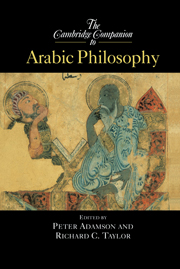Book contents
- Frontmatter
- 1 Introduction
- 2 Greek into Arabic
- 3 Al-Kindī and the reception of Greek philosophy
- 4 Al-Fāarābī and the philosophical curriculum
- 5 The Ismāīlīs
- 6 Avicenna and the Avicennian Tradition
- 7 Al-Ghazālī
- 8 Philosophy in Andalusia
- 9 Averroes
- 10 Suhrawardī and Illuminationism
- 11 Mysticism and philosophy
- 12 Logic
- 13 Ethical and political philosophy
- 14 Natural philosophy
- 15 Psychology
- 16 Metaphysics
- 17 Islamic philosophy and Jewish philosophy
- 18 Arabic into Latin
- 19 Recent trends in Arabic and Persian philosophy
- Select bibliography and further reading
- Index
5 - The Ismāīlīs
Published online by Cambridge University Press: 28 May 2006
- Frontmatter
- 1 Introduction
- 2 Greek into Arabic
- 3 Al-Kindī and the reception of Greek philosophy
- 4 Al-Fāarābī and the philosophical curriculum
- 5 The Ismāīlīs
- 6 Avicenna and the Avicennian Tradition
- 7 Al-Ghazālī
- 8 Philosophy in Andalusia
- 9 Averroes
- 10 Suhrawardī and Illuminationism
- 11 Mysticism and philosophy
- 12 Logic
- 13 Ethical and political philosophy
- 14 Natural philosophy
- 15 Psychology
- 16 Metaphysics
- 17 Islamic philosophy and Jewish philosophy
- 18 Arabic into Latin
- 19 Recent trends in Arabic and Persian philosophy
- Select bibliography and further reading
- Index
Summary
The Ismā‘īlī attitude toward philosophy and the philosophers was decidedly ambiguous. They tried consistently to deny that philosophers, in particular the ancient Greeks, possess an authority in any way superior to that of the legislating prophets of their own tradition. Despite an admirable skill with, and even mastery of, mathematics, physics, and logic, the practitioners of philosophy, in their view, had achieved almost nothing that they had not taken from a prophetic source. Ismā‘īlī rejection of philosophy, however, covered less the content of that philosophy than the contributions claimed for individual thinkers. For the Ismā‘īlīs, the philosophers, on their own, were capable of little except personal speculations that yielded them mere opinions - often mutually contradictory ones at that. Anything that was true in philosophy depended in the end on the sure guidance of divinely inspired prophets; without it the work of philosophers, no matter how brilliant and profound, produced a result ultimately lacking validity and real value.
Nevertheless, Ismā‘īlī thought in its formative period would be simply unintelligible without philosophy, most especially Neoplatonism, which so permeates the works of the main figures that what they said is incomprehensible otherwise than by reference to a classical Greek background. These writers had clearly imported and used various elements of philosophy, not merely in vague generalities, but in specific terms and a technical language that derived more or less directly from translations of ancient texts. Although the works they wrote to explain their Ismā‘īlīsm were not as a whole strictly speaking philosophical, many portions of them are in reality small treatises of philosophy.
- Type
- Chapter
- Information
- The Cambridge Companion to Arabic Philosophy , pp. 72 - 91Publisher: Cambridge University PressPrint publication year: 2004



